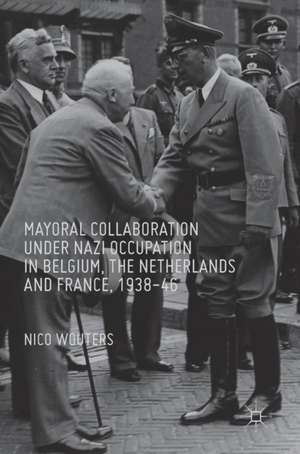Mayoral Collaboration under Nazi Occupation in Belgium, the Netherlands and France, 1938-46
Autor Nico Woutersen Limba Engleză Hardback – 5 oct 2016
| Toate formatele și edițiile | Preț | Express |
|---|---|---|
| Paperback (1) | 783.20 lei 6-8 săpt. | |
| Springer International Publishing – 14 iun 2018 | 783.20 lei 6-8 săpt. | |
| Hardback (1) | 965.31 lei 6-8 săpt. | |
| Springer International Publishing – 5 oct 2016 | 965.31 lei 6-8 săpt. |
Preț: 965.31 lei
Preț vechi: 1177.21 lei
-18% Nou
Puncte Express: 1448
Preț estimativ în valută:
184.71€ • 193.34$ • 153.74£
184.71€ • 193.34$ • 153.74£
Carte tipărită la comandă
Livrare economică 31 martie-14 aprilie
Preluare comenzi: 021 569.72.76
Specificații
ISBN-13: 9783319328409
ISBN-10: 3319328409
Pagini: 432
Ilustrații: XII, 350 p.
Dimensiuni: 148 x 210 x 27 mm
Greutate: 5.71 kg
Ediția:1st ed. 2016
Editura: Springer International Publishing
Colecția Palgrave Macmillan
Locul publicării:Cham, Switzerland
ISBN-10: 3319328409
Pagini: 432
Ilustrații: XII, 350 p.
Dimensiuni: 148 x 210 x 27 mm
Greutate: 5.71 kg
Ediția:1st ed. 2016
Editura: Springer International Publishing
Colecția Palgrave Macmillan
Locul publicării:Cham, Switzerland
Cuprins
Introduction.- 1. Local Democracies.- 2. Adaptation (1940).- 3. Infiltration (1940-41).- 4. The Limits of Nazification.- 5. The Limits of Good Governance.- 6. Systems of Repression.- 7. Disintegration.- 8. Transition.- Conclusion.
Recenzii
“Nico Wouters’s Mayoral Collaboration offers a comprehensive account of mayoral activities in Belgium, the French Nord-Pas-de-Calais, and the Netherlands during the Second World War. His work is well-researched and offers an interesting interpretation about the resilience of democratic culture in the face of totalitarian repression. Specialists in the field and interested generalists should read it.” (Keith Rathbone, H-France Review, Vol. 19 (161), 2019)
“One closes this book with admiration for the enormous amount of information Nico Wouters accumulated, and hopes that his next publication will draw the attention not only of the specialists but also of the interested public.” (István Deák, Holocaust and Genocide Studies, Vol. 33 (1), 2019)
Notă biografică
Nico Wouters is Academic Coordinator at the Brussels CegeSoma and Guest Professor at the History Department of Ghent University, Belgium. He is co-editor in chief of the Journal of Belgian History and editorial board member of the Low Countries Historical Review. He recently published an edited volume, Transitional Justice and Memory in Europe 1945-2013 (2014).
Textul de pe ultima copertă
This book explores the role of mayors in navigating the realities of living and governing under Nazi occupation. In Western Europe under Nazi occupation, mayors of villages and cities were forced into strategic cooperation with the occupier. Mayors had to provide good governance, mediate between occupier and populations, maintain personal legitimacy, and build local consensus. However, as national systems underwent authoritarian reform and collaborationists infiltrated administrations, local governments were gradually turned into instruments of Nazi control and repression. Nico Wouters uses rich new archival data to compare the realities of local government in three countries. Looking at topics such as food supply, public order and safety, forced labour, the repression of resistance, the persecution of the Jews and post-war purges, this book redefines our knowledge of collaboration, resistance and accommodation during Nazi occupation.
Caracteristici
Explores the role mayors played in navigating the realities of everyday life under the Nazis Demonstrates how local mayors were gradually turned into instruments of control and repression Utilises new and insightful archival data to compare mayoralities in three countries





